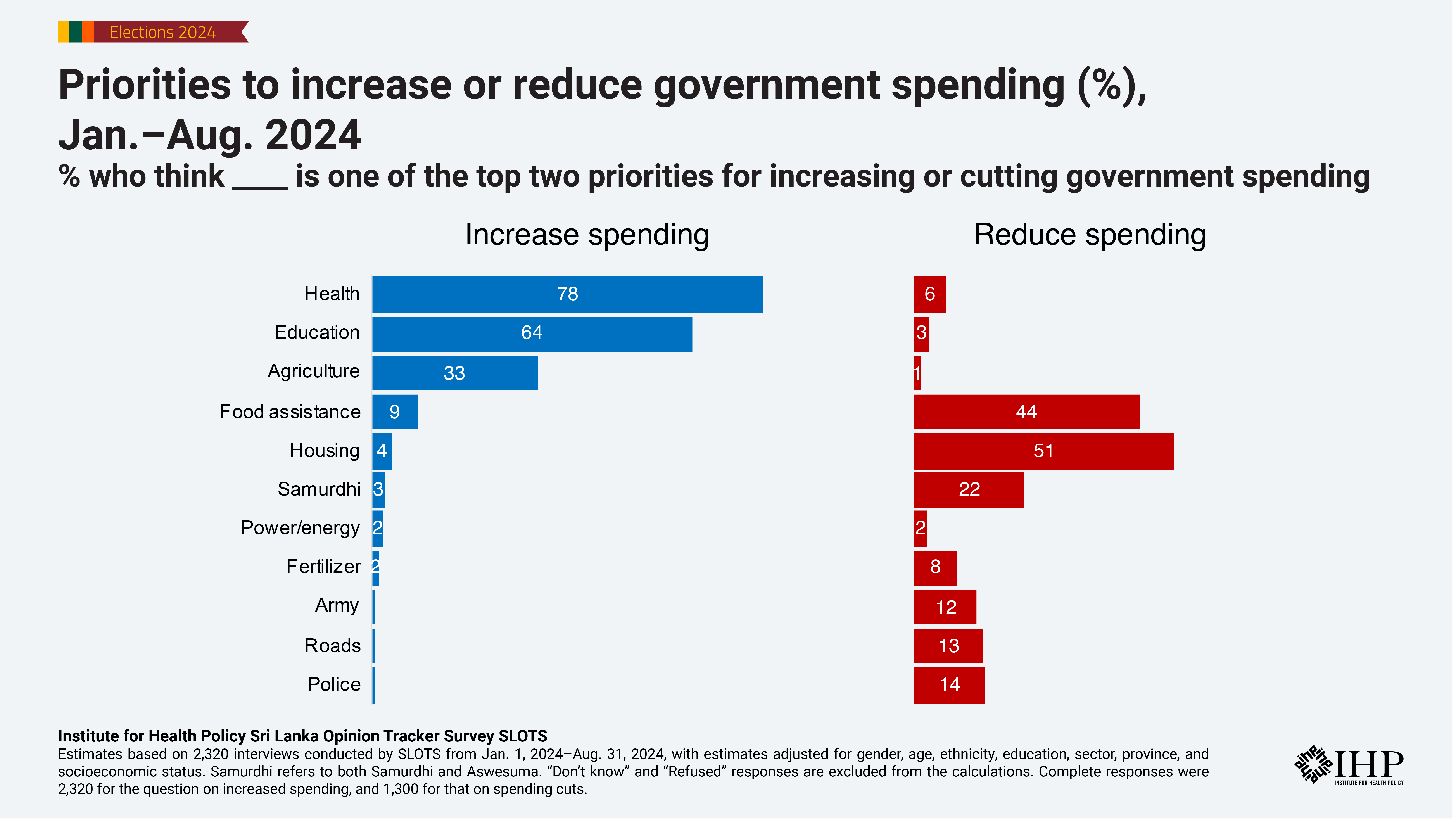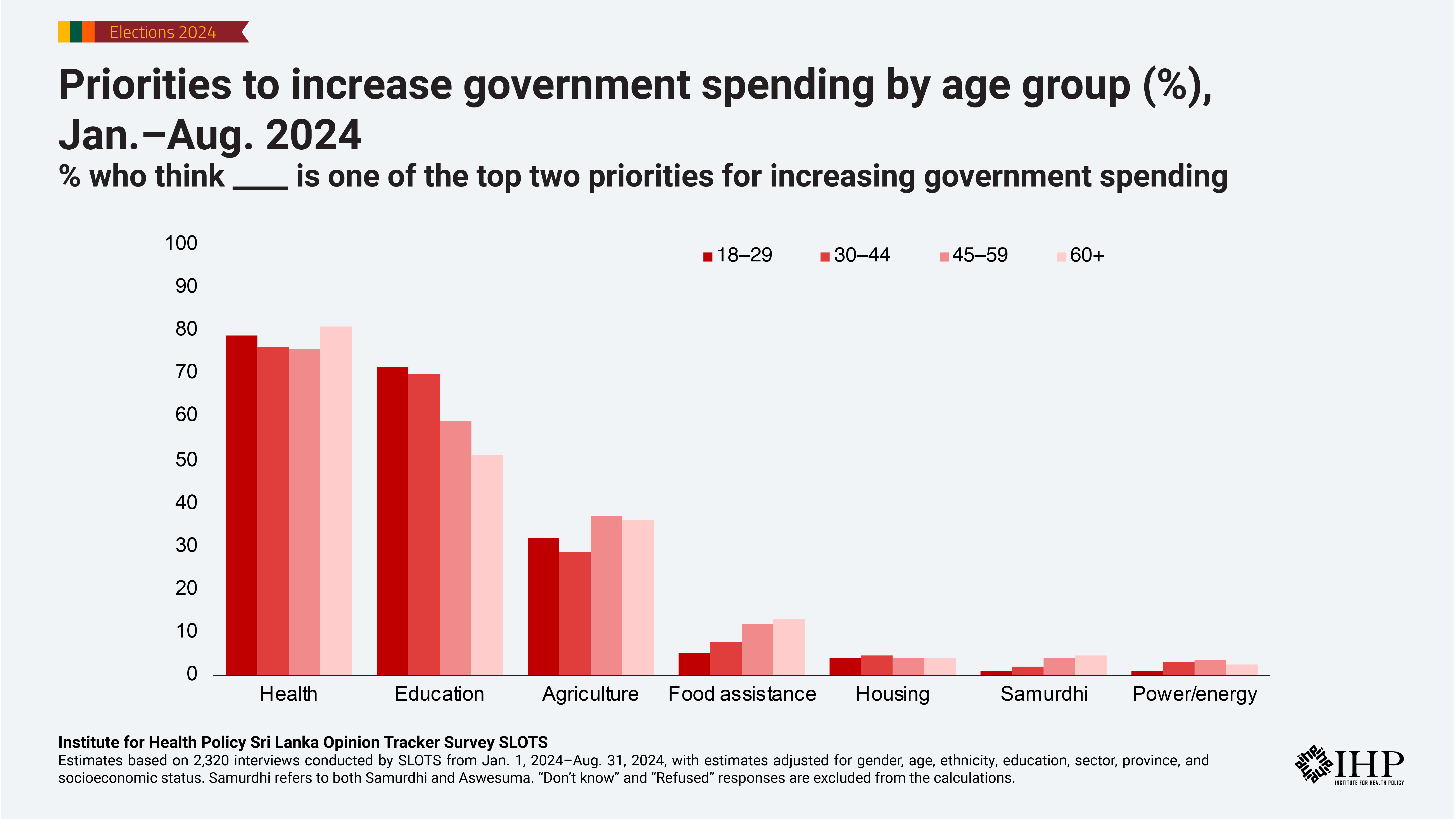Press Release
As Sri Lankans head to the polls, large majorities of voters want the government to increase spending on health and education, according to the latest findings from the Sri Lanka Opinion Tracker Survey (SLOTS).

Since September 2022, as the economic crisis forced the government to rethink budget priorities, SLOTS has regularly asked survey respondents to identify their top two priorities for increasing government spending and their top two priorities for cutting government spending.
Throughout 2024, the top priorities for Sri Lankans for increased government spending have consistently been health (78%) and education (64%). These were also the only areas where spending increases were supported by majorities of Sri Lankans, with support cutting across all demographics. Agriculture was the next highest priority for increased spending (33%), followed byfood assistance (9%), housing (4%), and Samurdhi/Aswesuma (3%).
Not surprisingly, SLOTS respondents have been more reluctant to identify priorities for cutting spending, and only one spending category—housing—receivedmajority support for reductions. When asked what they would prioritize for spending cuts if the government lacked funds, the highest ranked items were housing (51%) and food assistance (44%), followed by Samurdhi/Aswesuma (22%), the police (14%), roads (13%), and the military (12%).
Support for increasing government spending on health and education was widespread across all demographics. Both poor and better-off Sri Lankans rank health (71% vs. 79%) as their top priority for increased spending. The better-off were more likely to prioritize education (70% vs. 53%), but both the poor and the rich agreed on the need to increase spending in these two areas. There were few differences based on age, although youth (18–29 years) were more likely to prioritize education spending compared to older adults (60+).

Sri Lankans (17%) than for the better-off (5%). Similarly, one-fourth of the poor (29%) prioritized it for spending cuts, while nearly half of the better-off (49%) supported reducing spending on food assistance. Similar preferences were seen for Samurdhi/Aswesuma, with the poor much more likely to prioritize it for increases in spending, while the better-off much more likely to prioritize it for spending cuts.
There was no support for prioritizing the army or the police for spending increases, and one in eight Sri Lankans prioritize either for reducing spending. However, poor Sri Lankans were more likely to cite the army or police as a priority for cutting spending.
There are notable differences in spending priorities among different ethnic groups. Sinhala adults were more likely than other ethnic groups to prioritize health (82%) and education (66%). Meanwhile, Estate/Indian Tamil and Muslim adults were more likely to prioritize food assistance (Estate 32%, Muslim 27%) and housing (Estate 22%, Muslim 22%) compared to others.
Although health and education have consistently remained the top two spending priorities, the percentage of people prioritizing increased spending on health has steadily increased from 58% in 2023Q1, reaching 87% in 2024Q3. This may reflect the worsening impact of shortages of medicines and staffing in the government health sector, combined with the increasing difficulties most Sri Lankans face in paying for private health care as real incomes have fallen. Meanwhile, support for spending increases on agriculture has declined.
About IHP
IHP is solely responsible for commissioning and designing the survey, and it takes full responsibility for it. IHP is an independent, non-partisan research institution based in Colombo, Sri Lanka. The SLOTS lead investigator is Dr Ravi Rannan-Eliya of IHP, who was trained in public opinion polling at Harvard University, and who has conducted many opinion surveys over three decades.
Methodology
SLOTS interviews representative samples of Sri Lankan adults every day by telephone to gather their current views and situation. All interviews include a core set of common questions, with additional rotating sets of other questions that examine issues of topical importance. Interviews are done daily by phone by IHP employees, with respondents recruited by a national field survey or by randomly dialling mobile phone numbers.
Funding
SLOTS fieldwork since 2021 has been supported by a range of funders, who play no role in question design, data analysis, or reporting. Past funders have included the Neelan Tiruchelvam Trust, Asia Foundation, European Commission, UK National Institute for Health and Care Research, the Foundation Open Society Institute, and others. Current fieldwork is supported by funding from the Velux Stiftung foundation, New York University Abu Dhabi, and the IHP Public Interest Research Fund. The survey findings and IHP reporting do not necessarily reflect the views or positions of past and present funders. Interested parties can contact IHP for more detailed data and results.
EMBARGOED UNTIL
Date: 12 September 2024
Time: 07:00 PM Sri Lanka Time
FOR FURTHER INFORMATION CONTACT
Secretary/Administrator
Email: info ‘at’ ihp.lk
TO CONTACT LEAD INVESTIGATOR
Dr. Ravi Rannan-Eliya
Email: ravi ‘at’ ihp.lk Twitter: @ravirannaneliya
